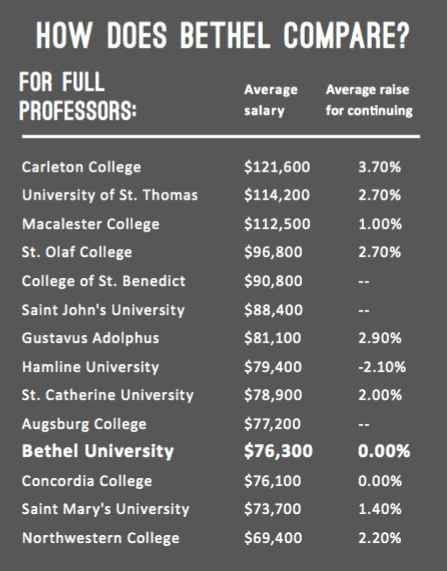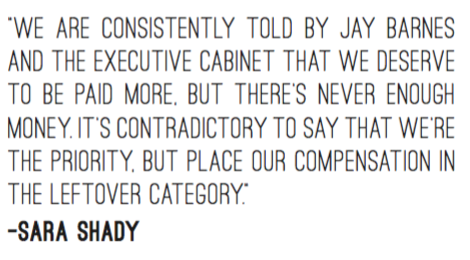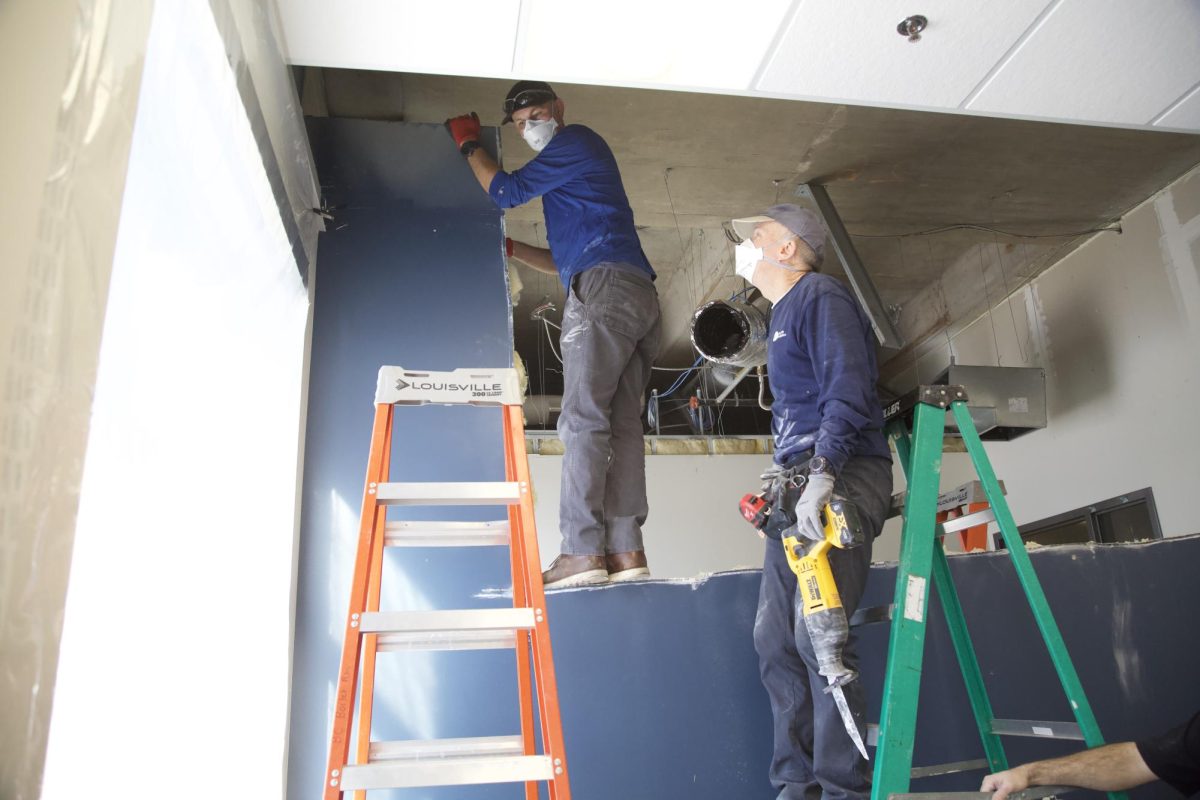Salary freezes and retirement cuts become source of contention
Jenny Hudalla | Editor-in-Chief
Cherie Suonvieri | Managing Editor
Published in The Clarion November 6, 2014
Nothing causes a stir like a community-wide financial crisis, and there’s no denying that last year’s budget cuts hit Bethel hard. Administration shaved $7 million from the university’s operating expenses over three years, engulfing Bethel in a storm of academic and personnel cuts.
Though the dust has now settled, some faculty and staff aren’t sure they like what they see. After receiving salary freezes for three of the last seven years and stomaching a 7 per- cent reduction in retirement contributions as part of last year’s budget cuts, many employees are upset that they still haven’t been given a raise for the 2014-2015 school year.
“People aren’t sure what we can do, but the status quo can’t stay the same,” said philosophy professor Sara Shady, who has been at Bethel for more than 13 years. “It’s starting to affect the way people see their jobs, and it’s starting to affect the spirit of collaboration that has historically existed between faculty and administration.”

According to Shady, it’s not that there isn’t any money – it’s that the administration chooses to spend it in areas other than faculty compensation. In the last few years alone, Bethel has purchased a $5.7 million property at 2 Pine Tree Drive and invested in the operational costs of the new Wellness Center.
“I think faculty are tired of hearing the administration say, ‘We get it, we’re sorry,’” said English professor Marion Larson. “I would rather have them say [faculty compensation] isn’t even a priority. It would be like I never returned graded papers but always said, ‘It’s my number one priority to give students feedback on their work.’”
In response to faculty’s frustration over the administration’s alleged lack of follow through, Chief Financial Officer Patrick Brooke offered words of empathy.
“I understand,” Brooke said. “We are going to do what we can to prove [faculty compensation] is a priority… I know things that are going on that haven’t been settled yet — some proposals we’re kicking back and forth. We want to make sure anything we do is sustainable.”
According to business professor Bruce Olsen, much of the revenue generated by tuition is given back to students in the form of financial aid. As the cost of running the institution increases and revenue stagnates, Olsen said budget cuts become an unfortunate necessity.
“[President Jay Barnes] really wanted us to find some dollars last year for increases, but so much is dictated by enrollment and financial aid that he really couldn’t give out any more,” Olsen said.
After last year’s budget cuts, Barnes created a budget committee comprising five administrators and four faculty members who drafted a proposed budget to submit to the President’s Cabinet, according to Provost Deb Harless. When the budget was approved by the Cabinet, it was submitted to the Board of Trustees for final approval.
 Business Department Chair Chuck Hannema was part of the committee that prioritized this year’s budget. He said it would have cost $500,000 to give faculty and staff a one percent raise — half a percent of Bethel’s $100 million budget. Although he was a vocal supporter of the salary increase, Hannema wasn’t able to sway the final outcome.
Business Department Chair Chuck Hannema was part of the committee that prioritized this year’s budget. He said it would have cost $500,000 to give faculty and staff a one percent raise — half a percent of Bethel’s $100 million budget. Although he was a vocal supporter of the salary increase, Hannema wasn’t able to sway the final outcome.
“I think professors are able to weather the storm because most of us are willing to make further sacrifices to do what we do,” Hannema said. “But I think the administration is able to benefit from that at our expense.”
While Olsen certainly shares in faculty frustration, his experience as Faculty Senate president and previous acting associate dean has enabled him to see both sides of the issue in a softer light.
“It weighs on faculty when we spend money on things like baseball field repairs and classroom construction,” Olsen said. “It doesn’t seem fair. At the same time, there are some things you just have to spend money on. We need to reorient our thinking in the budgeting process.”
According to Harless, the budget committee is still seeking ways to o er salary increases to faculty and staff this year.
“It is a tremendous challenge to allocate money for raises, but we know that we must provide raises to care for our employees and to keep Bethel strong,” Harless said.
That, at least, is something on which administration, faculty and staff agree: salary increases are needed, and they are needed soon.
“The difference faculty and staff make in students’ lives is significant,” Hannema said. “If faculty are dissatisfied, they won’t stay. If we don’t have competitive structures to recruit new faculty, the Bethel experience will suffer.”























